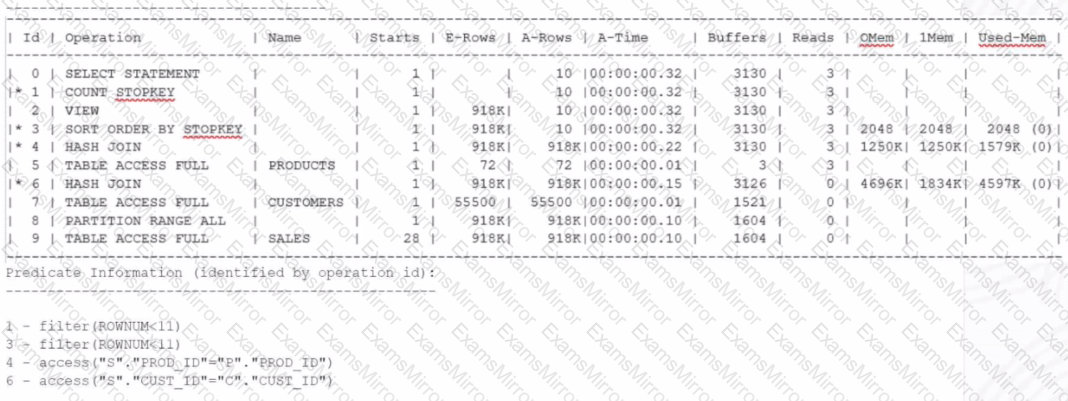special code - Ends in 0d 00h 00m 00s - Coupon code = discmirror
Pass the Oracle Database 19c 1z0-084 Questions and answers with ExamsMirror
Exam 1z0-084 Premium Access
View all detail and faqs for the 1z0-084 exam
680 Students Passed
97% Average Score
92% Same Questions
Which two actions can cause invalidation or loss of one or more results in the SQL Query Result Cache?
The CURS0R_SHARING and OPTIMIZER_CAPTURE_SQL_PLAN_BASELINES parameters are set to default. The top five wait events in an awr report are due to a large number of hard parses because of several almost identical SQL statements.
Which two actions could reduce the number of hard parses?
Buffer cache access is too frequent when querying the SALES table. Examine this command which executes successfully:
ALTER TABLE SALES SHRINK SPACE;
For which access method does query performance on sales improve?
Which procedure gathers statistics that are always used in the generation of any execution plan?
Database performance degraded between 23:15 and 23:30 for the last three nights. The awr snapshot interval is one hour. The AODM report contains nothing about this performance problem.
With which tool can you further analyze this problem?
You must write a statement that returns the ten most recent sales. Examine this statement:

Users complain that the query executes too slowly. Examine the statement's current execution plan:

What must you do to reduce the execution time and why?
You use SQL Tuning Advisor to tune a given SQL statement.
The analysis eventually results in the implementation of a SQL Profile.
You then generate the new SQL Profile plan and enforce it using a SQL Plan Baseline but forget to disable the SQL Profile and a few days later you find out that the SQL Profile is generating a new execution plan.
Which two statements are true?
During which application lifecycle phase do you take baselines?
You need to collect and aggregate statistics for the ACCTG service and PAYROLL module, and execute:

Where do you find the output of this command?
Examine this code block, which executes successfully:
DBMS_SERVER_ALERT. SET_THRESHOLD (
DBMS_SERVER_ALERT.CPU_TIME_PER_CALL, DBMS_SERVER_ALERT. OPERATOR_GE, '8000',
DBMS_SERVER_ALERT.OPERATOR_GE, '10000', 1, 2, 'inst1',
DBMS_SERVER_ALERT.OBJECT_TYPE_SERVICE, 'main.regress.rdbms.dev.us.example.com') ;

What will happen?
TOP CODES
Top selling exam codes in the certification world, popular, in demand and updated to help you pass on the first try.
